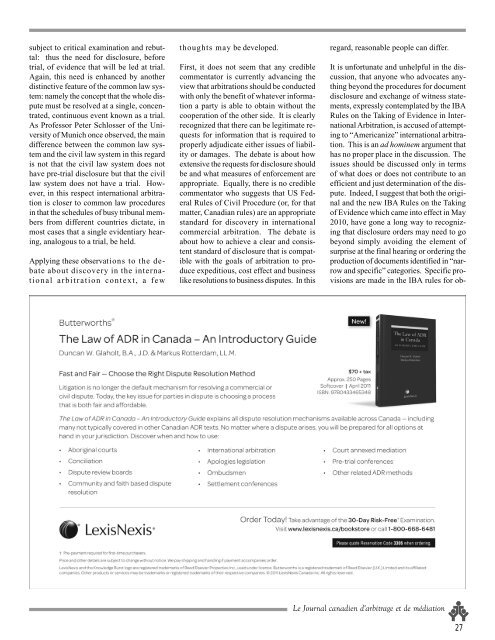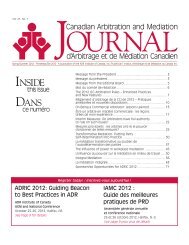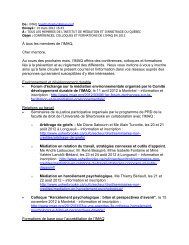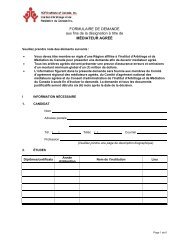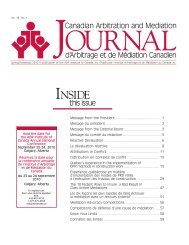Printemps 2011 - ADR Institute of Canada
Printemps 2011 - ADR Institute of Canada
Printemps 2011 - ADR Institute of Canada
You also want an ePaper? Increase the reach of your titles
YUMPU automatically turns print PDFs into web optimized ePapers that Google loves.
subject to critical examination and rebuttal:thus the need for disclosure, beforetrial, <strong>of</strong> evidence that will be led at trial.Again, this need is enhanced by anotherdistinctive feature <strong>of</strong> the common law system:namely the concept that the whole disputemust be resolved at a single, concentrated,continuous event known as a trial.As Pr<strong>of</strong>essor Peter Schlosser <strong>of</strong> the University<strong>of</strong> Munich once observed, the maindifference between the common law systemand the civil law system in this regardis not that the civil law system does nothave pre-trial disclosure but that the civillaw system does not have a trial. However,in this respect international arbitrationis closer to common law proceduresin that the schedules <strong>of</strong> busy tribunal membersfrom different countries dictate, inmost cases that a single evidentiary hearing,analogous to a trial, be held.Applying these observations to the debateabout discovery in the internationalarbitration context, a fewthoughts may be developed.First, it does not seem that any crediblecommentator is currently advancing theview that arbitrations should be conductedwith only the benefit <strong>of</strong> whatever informationa party is able to obtain without thecooperation <strong>of</strong> the other side. It is clearlyrecognized that there can be legitimate requestsfor information that is required toproperly adjudicate either issues <strong>of</strong> liabilityor damages. The debate is about howextensive the requests for disclosure shouldbe and what measures <strong>of</strong> enforcement areappropriate. Equally, there is no crediblecommentator who suggests that US FederalRules <strong>of</strong> Civil Procedure (or, for thatmatter, Canadian rules) are an appropriatestandard for discovery in internationalcommercial arbitration. The debate isabout how to achieve a clear and consistentstandard <strong>of</strong> disclosure that is compatiblewith the goals <strong>of</strong> arbitration to produceexpeditious, cost effect and businesslike resolutions to business disputes. In thisregard, reasonable people can differ.It is unfortunate and unhelpful in the discussion,that anyone who advocates anythingbeyond the procedures for documentdisclosure and exchange <strong>of</strong> witness statements,expressly contemplated by the IBARules on the Taking <strong>of</strong> Evidence in InternationalArbitration, is accused <strong>of</strong> attemptingto “Americanize” international arbitration.This is an ad hominem argument thathas no proper place in the discussion. Theissues should be discussed only in terms<strong>of</strong> what does or does not contribute to anefficient and just determination <strong>of</strong> the dispute.Indeed, I suggest that both the originaland the new IBA Rules on the Taking<strong>of</strong> Evidence which came into effect in May2010, have gone a long way to recognizingthat disclosure orders may need to gobeyond simply avoiding the element <strong>of</strong>surprise at the final hearing or ordering theproduction <strong>of</strong> documents identified in “narrowand specific” categories. Specific provisionsare made in the IBA rules for ob-Le Journal canadien d'arbitrage et de médiation27


